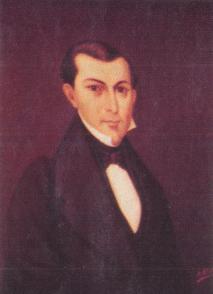William Littleton Harris on:
[Wikipedia]
[Google]
[Amazon]
 William Littleton Harris (1807–1868) was a Mississippi jurist.
William Littleton Harris (1807–1868) was a Mississippi jurist.
 William Littleton Harris (1807–1868) was a Mississippi jurist.
William Littleton Harris (1807–1868) was a Mississippi jurist.
Early life
Born inElbert County, Georgia
Elbert County is a county located in the northeastern part of the U.S. state of Georgia. As of the 2020 census, the population was 19,637. The county seat is Elberton. The county was established on December 10, 1790, and was named for Samue ...
, in 1807, Harris graduated from the University of Georgia
The University of Georgia (UGA or Georgia) is a Public university, public Land-grant university, land-grant research university with its main campus in Athens, Georgia, United States. Chartered in 1785, it is the oldest public university in th ...
at the age of fifteen, and read law
Reading law was the primary method used in common law countries, particularly the United States, for people to prepare for and enter the legal profession before the advent of law schools. It consisted of an extended internship or apprenticeship un ...
to be admitted to the bar.Thomas H. Somerville, "A Sketch of the Supreme Court of Mississippi", in Horace W. Fuller, ed.,''The Green Bag'', Vol. XI (1899), p. 511. His admission required an act of the legislature, due to his status as a minor. Harris moved to Mississippi in 1837 and lived in Lowndes County, where he successfully established a large legal practice.
Career
Harris became as a circuit judge in 1853, and in 1856 helped write theMississippi
Mississippi ( ) is a U.S. state, state in the Southeastern United States, Southeastern and Deep South regions of the United States. It borders Tennessee to the north, Alabama to the east, the Gulf of Mexico to the south, Louisiana to the s ...
code of 1857.
In 1858 Harris was appointed by Governor John J. McRae to a seat on the Mississippi High Court of Errors and Appeals vacated by the resignation of Ephraim S. Fisher.
His best-known opinion was ''Mitchell v. Wells'', decided in 1859. The case prohibited a formerly enslaved woman from inheriting from the estate of her white father.
In essence, it held that once someone was a slave
Slavery is the ownership of a person as property, especially in regards to their labour. Slavery typically involves compulsory work, with the slave's location of work and residence dictated by the party that holds them in bondage. Enslavemen ...
in Mississippi she would always be considered a slave, even though her father (and owner) had taken her to Ohio
Ohio ( ) is a U.S. state, state in the Midwestern United States, Midwestern region of the United States. It borders Lake Erie to the north, Pennsylvania to the east, West Virginia to the southeast, Kentucky to the southwest, Indiana to the ...
and freed her. The case illustrates the extreme southern position; it illustrates the uncompromising nature of southern law on the eve of Civil War
A civil war is a war between organized groups within the same Sovereign state, state (or country). The aim of one side may be to take control of the country or a region, to achieve independence for a region, or to change government policies.J ...
.
In 1860 President James Buchanan
James Buchanan Jr. ( ; April 23, 1791June 1, 1868) was the 15th president of the United States, serving from 1857 to 1861. He also served as the United States Secretary of State, secretary of state from 1845 to 1849 and represented Pennsylvan ...
tendered him the appointment to a seat on the Supreme Court of the United States
The Supreme Court of the United States (SCOTUS) is the highest court in the federal judiciary of the United States. It has ultimate appellate jurisdiction over all Federal tribunals in the United States, U.S. federal court cases, and over Stat ...
, but Harris declined "because of the impending secession".
Civil War
Instead of taking a seat on the Supreme Court, Harris took a position as acommissioner
A commissioner (commonly abbreviated as Comm'r) is, in principle, a member of a commission or an individual who has been given a commission (official charge or authority to do something).
In practice, the title of commissioner has evolved to incl ...
to Georgia, in which he was appointed by Mississippi Governor, John J. Pettus.
Secession speech
On December 17, 1860, Harris delivered an address to the Georgia General Assembly, in Milledgeville, supporting secession: The speech was so well received that one thousand copies of it were printed in pamphlet form.Reconstruction
After the war his appointment to the High Court of Errors and Appeals of Mississippi was overthrown by presidentAndrew Johnson
Andrew Johnson (December 29, 1808July 31, 1875) was the 17th president of the United States, serving from 1865 to 1869. The 16th vice president, he assumed the presidency following the assassination of Abraham Lincoln. Johnson was a South ...
in 1867.
Later life and death
In response to the beginning of Reconstruction, Harris left Mississippi and moved to Memphis. He formed a law firm with judge Henry T. Ellett and Confederate Colonel James Phelan, Sr. He died of pneumonia on November 27, 1868.References
{{DEFAULTSORT:Harris, William Littleton 1807 births 1868 deaths People from Lowndes County, Mississippi University of Georgia alumni Justices of the Supreme Court of Mississippi U.S. state supreme court judges admitted to the practice of law by reading law 19th-century American judges